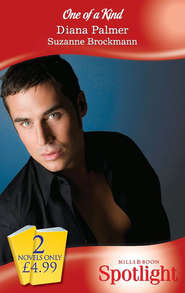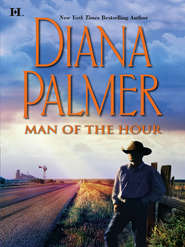По всем вопросам обращайтесь на: info@litportal.ru
(©) 2003-2024.
✖
Iron Cowboy / Seduced by the Rich Man: Iron Cowboy
Автор
Год написания книги
2019
Настройки чтения
Размер шрифта
Высота строк
Поля
“Just the thing,” Harley murmured, reading titles. “Mr. Parks still has an account, doesn’t he?”
“He and Lisa both do.”
“Well, you can put these on his tab.” He picked out four and handed them to her.
“Would it be safe to ask why you want them?” she mused as she went behind the counter to the cash register.
“Why not?” he sighed. “I thought I was telling Lanita, Juan’s wife, that it was hot outside. She blushed, Juan jumped me, and we rolled around in the dirt until I finally convinced him that I was just talking about the weather. We got up and shook hands, and then he told me what I’d actually said to her. I was just sick.” He groaned. “I speak a little Spanish, but I learned it in high school, and I’ve forgotten how not to say embarrassing things.” He groaned. “Juan and the rest of the workers speak English, but I thought I might get along better with them if I spoke a little Spanish. And this happens!”
She pursed her lips. “If you want to remark on the weather, in Spanish you say ‘there is heat,’ not ‘I am hot.’ Especially in front of a woman.”
“Thanks, I do know that now,” he replied, soothing his jaw. “That Juan hits like a mule kicking.”
“So I’ve heard.”
She totaled the books on the cash register and wrote down the tally in a book of accounts that Dee kept. “We’ll bill Mr. Parks.”
“Thanks.” He took the bag with the books. “If Mr. Parks wants to argue about me buying them, I’ll tell him to go talk to Juan.”
She grinned. “Good idea.”
He smiled back, and hesitated, as if he wanted to say something more. Just then, the phone rang, and it was one of her long-winded customers. She shrugged and waved at Harley. He waved back as he left. She wondered later what he’d been about to say.
He was handsome and well-known in the community for being a hardworking cowboy. He’d actually gone on a mission with three of the town’s ex-mercenaries to help stop Manuel Lopez’s drug-smuggling operation. He’d earned a lot of respect for his part in it. Sara liked him a lot, but he didn’t date much. Rumor was that he’d had a real case on a local girl who’d made fun of his interest in her and threw him over. But he didn’t look like a man with a broken heart.
Sara knew about broken hearts. She’d been sweet on a boy in the community college she attended to learn accounting. So had Marie, her best friend. The boy had dated both of them, but finally started going steady with Marie. A good loser, Sara had been maid of honor at their wedding. Marie and her new husband had moved to Michigan to be near his parents. Sara still wrote to Marie. She was too kindhearted to hold a grudge. Probably, she realized, the boy had only dated her because she was best friends with Marie. She recalled that he spent most of their time together asking her questions about Marie.
She was old-fashioned. Her grandfather had firm opinions about the morality deprived state of modern society. He and Sara went to church regularly and she began to share his views. She wasn’t the sort of girl who got invited to wild parties, because she didn’t drink or smoke or do drugs. Everyone knew that her grandfather was good friends with one of Police Chief Cash Grier’s older patrol officers, too. Her law enforcement connections made the party crowd cautious. It also got around that Sara didn’t “give out” on dates. There were too many girls who had no such hang-ups. So Sara and Morris spent most of their Friday and Saturday nights together with Sara’s grandfather, watching movies on television.
She wondered where the ogre had gone, and why Tony the Dancer hadn’t gone with him. Maybe he was off on a hot date somewhere. She wondered about the sort of woman who might appeal to a man with his gloomy outlook. But then she remembered that he’d been wearing an expensive suit, and driving a new truck, and he owned one of the bigger ranches in the county. Some women wouldn’t mind how gloomy and antisocial he was, as long as he had lots of money to spend on them.
He did look like a cold fish. But maybe he was different around people he liked. He’d made it obvious that he didn’t like Sara. The feeling was mutual. She hated having to give up her Saturday to his whim.
She phoned Lisa to tell her that she wouldn’t be able to come until the following Wednesday.
“That’s okay,” Lisa replied. “Cy and I wanted to take the baby to the mall in San Antonio on Saturday, but I was going to stay home and wait for you. There’s lots of sales on baby clothes and toys.”
Like Lisa needed sales, when her husband owned one of the most productive ranches in Texas, she thought, but she didn’t say it. “You’re always buying that baby clothes,” Sara teased. “He’s going to be the best-dressed little boy in town.”
“We go overboard, I know,” Lisa replied, “but we’re so happy to have him. Cy and I took a long time to get over losing our first one.”
“I remember,” Sara said softly. “But birth defects turn up sometimes in the healthiest families, you know. I read about it in one of the medical books we sell. This little boy is going to grow up and be a rancher, just like his parents.”
Lisa laughed softly. “Thanks, Sara,” she said gently. “You make me feel better every time I talk to you.”
“I’ll call you Wednesday, okay? Dee’s giving me a half-day, so I’ll have the afternoon off.”
“That will work out fine,” Lisa said.
“Thanks.”
“You’re very welcome.”
Sara hung up. Poor Lisa. Her first husband had been killed not long after their wedding. He’d been an undercover DEA agent, whom one of the drug dealer, Lopez’s, men had killed. Cy had taken her under his wing and protected her while she waited for the birth of her child. Harley said the baby she was carrying wasn’t her husband’s, because he had a vasectomy, but she’d thought she was pregnant. Only weeks after marrying Cy, she really was pregnant. But the baby was born with birth defects that were beyond a physician’s ability to cure. He’d died when he was only a week old, leaving two devastated parents to grieve. They hadn’t rushed into another pregnancy. But this one had worked out without any health issues at all. Their little boy, Gil, was a toddler, and very active.
Sara wondered if she’d ever get married and have a family, but it wasn’t something she dwelled on. She was young and the world would have been wide-open for her, except for her one small secret that she wasn’t anxious to share with anyone. Still, she was optimistic about the future. Well, except for the ogre.
She sighed. Every life had to have a few little irritations, she decided. And who knew? The ogre might turn out to be a handsome prince inside.
Two
It was pouring rain when Sara reluctantly crawled out of bed the next morning. She looked out the window and sighed.
“Boy, I’d love to go back under the covers and sleep, Morris,” she mused as she fed the old cat.
He rubbed up against her pajama-clad legs and purred.
She yawned as she made a pot of coffee and some buttered toast to go with it. Her grandfather had insisted on a balanced breakfast, but Sara couldn’t manage a lot of food early in the morning.
She nibbled toast and watched the rain bounce down over the camellia bush next to the window. She was going to get wet.
She dressed in jeans and a cotton blouse and threw her ancient tan raincoat over her clothes. It was embarrassing to wear such a tacky coat to a rich man’s house, but it was all she had. Her salary didn’t cover many new things. Mostly she shopped at thrift stores. The coat had a stained neck and two or three tears where Sara—never the world’s most graceful woman—had tripped over garden stakes or steps or her own feet and brushed against nails and a barbed-wire fence. She looked down and noticed that she was wearing socks that didn’t match. Well, it was something she just had to learn to live with. The doctor told her she’d cope. She hoped he was right. She was nineteen, and sometimes she felt fifty when she tried to force her mind to comprehend matching colors.
Groaning, she checked her watch. It was fifteen to ten, and it would take her almost all that time to get to the White Horse Ranch. Well, the ogre would just have to make fun of her. She didn’t have time to unload her sock drawer and find mates. They were hidden under her jeans, anyway, and maybe he wouldn’t notice.
She stepped right into a hole filled with muddy water getting to her car. Her sneakers and her socks were immediately soaked. She groaned again as she unlocked the little car and quickly climbed in. The seats were leather, thank goodness, and they’d shed water. Her VW was seven years old, but the mechanics at Turkey Sanders’s used car lot kept it in good repair. Despite his reputation for bad car sales, Turkey prided himself on his mechanics.
She patted its cracked dash. The VW had been wrecked, so she got it very cheaply. Probably it would fall apart if she tried to drive it as far as San Antonio. But she never left the Jacobsville area, and it was dependable transportation.
It started on the first go, making that lovely race car sound that made her think of luxury racers as she gunned the engine. If she closed her eyes and did that, sometimes it sounded just like a Formula 1 challenge car.
“In my dreams,” she laughed to herself. She wouldn’t earn enough in her lifetime to make six months of payments on one of those fancy sports cars. But it was just as well. The little black VW suited her very well.
She pulled out of her driveway onto the dirt road that led out to the state highway. It had been recently scraped and a little new gravel had been laid down, but it was still slippery in the rain. She gritted her teeth as she felt the car slide around in the wet mud. At least it was flat land, and even if she did go into a ditch, it wouldn’t be a deep one. All the same, she didn’t look forward to walking for help in that molasses-thick mud. She remembered a long walk in similar red mud, overseas, with the sound of guns echoing… She drew her mind back to the present. Dwelling on the past solved nothing.
By downshifting, not hitting the brakes and going slowly, she managed to get to the paved highway. But she was going to be late getting to the ogre’s house. She grimaced. Well, it couldn’t be helped. She’d just have to tell him the truth and hope he was understanding about it.
“I specifically said ten o’clock,” he shot at her when he opened the front door.
He was wearing jeans and a chambray shirt and working boots—you could tell by the misshapen contours of them that many soakings had caused—and a ratty black Stetson pulled low over his forehead. Even in working garb, he managed to look elegant. He looked like a cowboy, but they could have used him as a model for one made of metal. An iron cowboy.
She had to fight a laugh at the comparison.
“And you’re dripping wet all over,” he muttered, glaring at her clothes. “What the hell did you do, swim through mud holes on your way here?”
“I stepped in a mud puddle on the way to my car,” she began, clutching a plastic bag that held his books.
He looked past her. “I don’t know what the hell that thing is, but I wouldn’t dignify it by calling it a car.”











